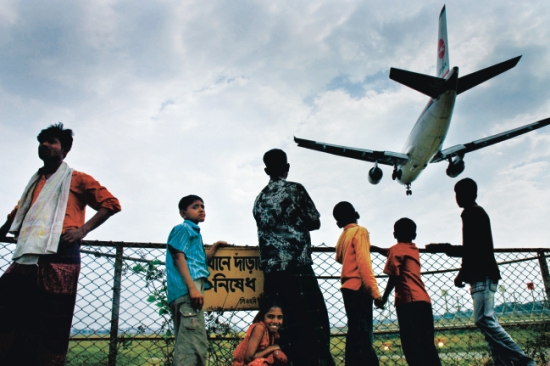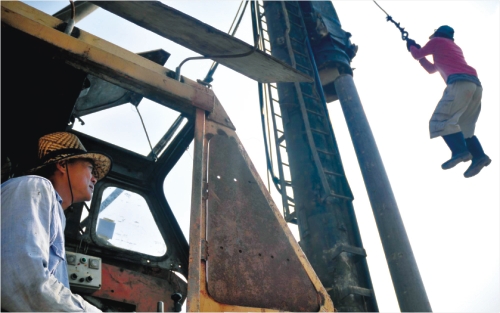
Inside
|
Md. Golzare Nabi and Md. Mahmudul Alam look at the performance and challenges of remittance inflows into Bangladesh Bangladesh has been witnessing a surge in remittance inflow since 2002, thanks to measures taken to encourage remitters in sending their money through official channels. Remittances have brought immense benefit to the Bangladesh economy in terms of employment generation, poverty alleviation, import financing, and building of healthy foreign exchange reserves. The stability of remittance inflows has become an important policy issue due to its growing potential which affects both micro and macro economy via current account financing and influencing liquidity of the banking system. As remittances are counter-cyclical and quid-pro-quo in nature, and these flows have no future payment obligations like other forms of foreign capital, and have exhibited resilience and stability, Bangladesh should pay topmost priority to tap huge amount of foreign exchange by exporting millions of unemployed youths to remove constraints of financing development activities to make Bangladesh free of poverty within 2020. In the backdrop of declining trend of Official Direct Assistance (ODA) and fierce competition for Foreign Direct Investment (FDI), massive remittance flow to Bangladesh would also curtail dependency on conditional foreign funds and would enhance the policy sovereignty. Though remittance inflow to Bangladesh is increasing and relatively stable compared with world remittance flow, it is still in a very risky state: they are highly country specific and job category specific. In 2006, over 66% of our remittances came from the Middle East, especially from KSA (35%). From 1976 to 2007, more than 84% of our total labourers migrated to the Middle East, especially in KSA (45%). As a result, any economic or political crisis in the Middle East or unfavourable inter-country relationship will destructively reduce the remittance inflow in Bangladesh. When people migrate only in a specific job sector, any economic movement of this sector will reduce remittance drastically. Also, within a very short period, few specific countries' specific job sectors will not require more labour. As a result, Bangladesh needs to diversify its migration to other job sectors. The skilled and highly salaried professionals can generate huge remittances, but they are the least migrating group from Bangladesh. From 1976 to 2007, the category breakdown was: unskilled: 51%, skilled: 30%, semi-skilled: 16% , and professional: 3%. In 2007, this record is far worse: unskilled: 58%, skilled: 20%, semi-skilled: 22%, and professional: 0%. If Bangladesh is able to send more skilled and professional labour, her remittance inflow would increase at a significant rate. Only a handful of labourers migrate from Bangladesh through the government; the rest migrate through individuals or recruitment agencies. From 1976 to 2007, the total labour migration was as follows: individual: 60%, recruiting agent: 39%, and government channel: 1%. In 2007, total labour migrated through individual: 56%, recruiting agent: 44%, and government channel: 0%. The government is a more powerful player than individual persons or recruitment agencies in terms of negotiating for job salaries and opportunities. When people migrate individually or through recruiting agencies, they may not negotiate properly with the actual authority or may not be able to get proper jobs. Sometimes, people also face fraudulent activities. Due to this, although many people are migrating, remittance inflow is low in comparison to the wage earners from abroad. In such a situation, if the government increases the rate of labour migration through government channel, it will accelerate the remittance inflow in a sustainable way. In the last few years, many skilled labourers started to migrate permanently from Bangladesh to developed countries. Despite these developments, Bangladesh government has not prepared a proper migration policy. Scholars already raised the issue of brain drain due to skilled labour migration to developed countries. As a labour surplus country, Bangladesh can easily remove negative effects of brain drain by providing necessary training to its vast unskilled surplus labour.
At the same time, there is no social security system or social insurance for remitters and no provision for voting at the time of national elections. The roles of nationalised commercial banks (NCBs) are gradually decreasing while private banks are emerging as major players in channeling remittances. There are not enough facilities to transfer remittance in Bangladesh from different countries. At the same time, transfer fees are also high and remittance transfer to rural areas is not hassle free, which leads to flow of remittances through illegal channels. The recruiting fees are also higher in Bangladesh compared to other developing countries. Current investment areas for remitters are not attractive enough to grab huge attention in Bangladesh. There is only one mutual fund for non-resident Bangladeshis (NRBs) in the capital market. At the same time, most of the incoming remittances are used only for consumption purpose. In many cases, immigrants cannot invest in any productive sector, so they only buy land. As a result, inadequate investment opportunities for non-resident Bangladeshis lead to higher land price and inflation in Bangladesh. Following the above mentioned circumstances, this paper concludes that Bangladesh as a labour-exporting country can influence the inflow of remittances by means of appropriate policies of building hassle free remittance sending infrastructure, searching new overseas markets, further improvement of formal channel of fund transfer, establishing specialised banks, special economic zone, township, and creating investment avenues such as special bonds, shares, ownership in social development projects, etc for non-resident Bangladeshis. Bangladesh needs to formulate and implement a National Migration Policy in order to enhance remittances inflow and ensure welfare of remitters, and the Bangladeshi embassies abroad should be more active. Bangladesh has to develop her financial sector further to facilitate remittance inflows at a greater pace by adopting measures such as automation of rural bank branches, encouraging private banks to open branches in rural areas, and allowing well-established NGOs and micro-finance institutions to receive and disburse remittances through their vast rural network.
Further rigorous research should be conducted to examine trends, determinants and policy options so that remittances can be a viable sustainable source of development finance in Bangladesh. Md. Golzare Nabi is Joint Director, Monetary Policy Department, Bangladesh Bank. Md. Mahmudul Alam is an Officer, Customer Relationship Management (CRM), Marketing Division, Grameen-phone. The views expressed in the research paper are authors' own and do not reflect those of the organizations in which they work.
|


